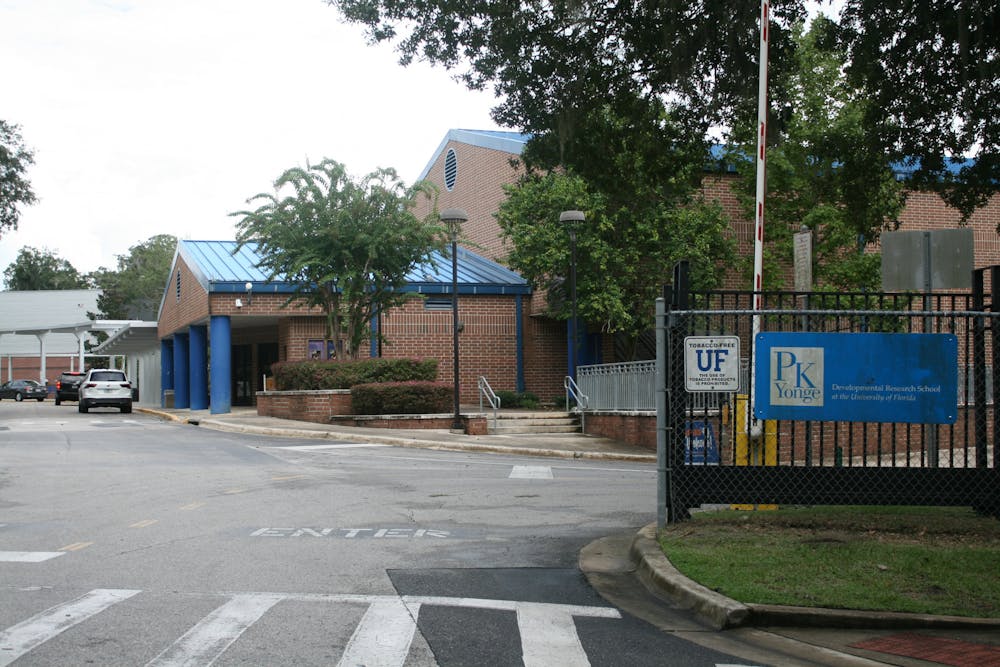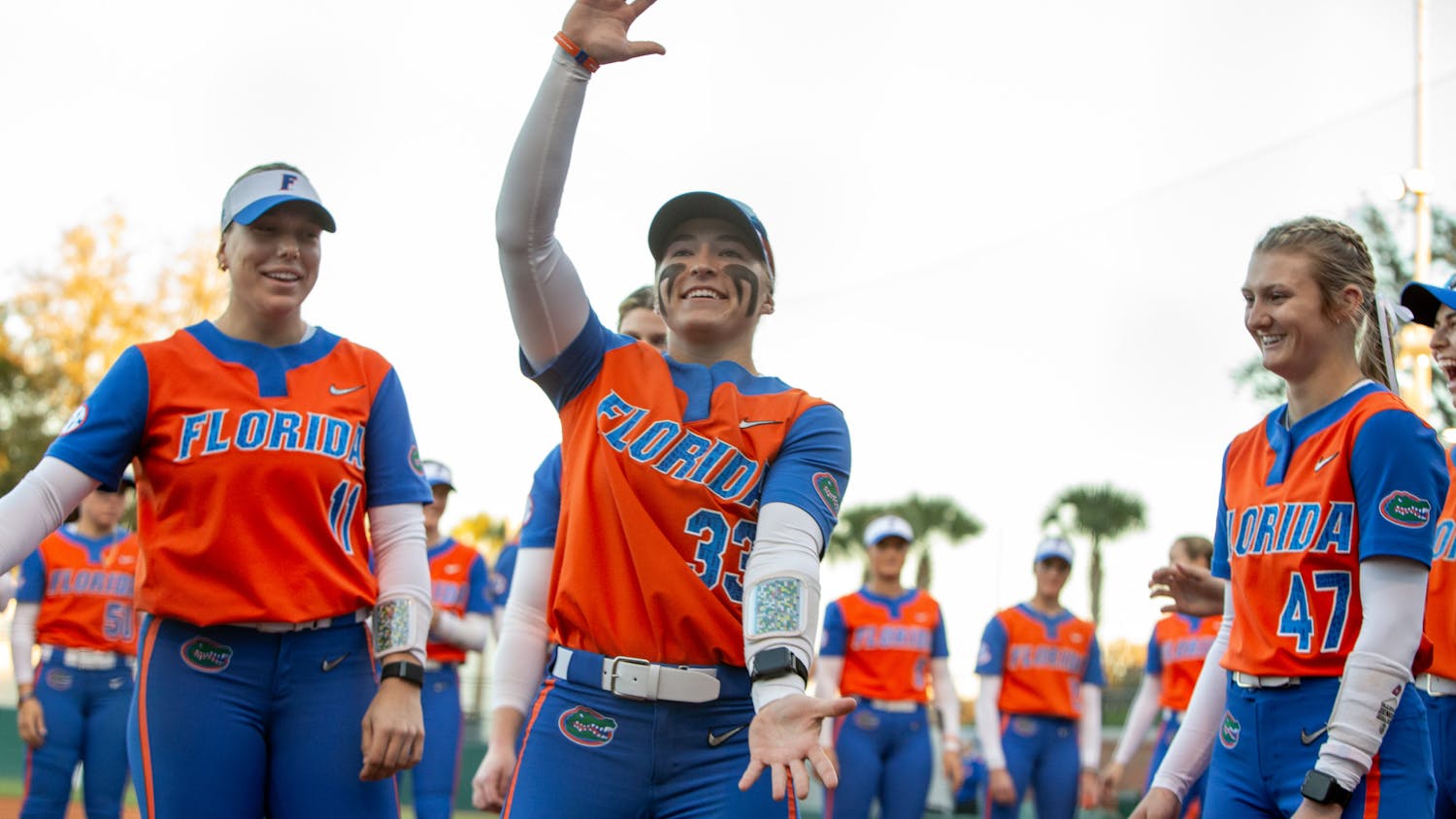Before entering sixth grade, students at P.K. Yonge Developmental School have to make the jump from one side of Tumblin’ Creek to another.
The waterway, which divides campus based on grade level, serves as a literal and symbolic bridge between the elementary and secondary school students. On the north side of the water stand students K-5, who wait until the final week of their fifth grade school year before they cross the walkway with their parents, signifying their transition into the next tier of their education.
P.K. Yonge, a laboratory school governed by UF, allows faculty and staff the unique opportunity to explore new methods of teaching without having to follow district policy. At P.K. Yonge, this means rock band class, a student-run business class and college-level courses affiliated with UF.
Every year, parents across Alachua County jump at the chance to apply for the chance to send their kindergarteners to the school, which is determined by a lottery system.
P.K. Yonge is one of four Florida K-12 schools directly affiliated with a university, serving as its own school district. P.K. Yonge isn’t affiliated with Alachua County Public Schools and has its own superintendent. All P.K. Yonge employees carry GatorONE Cards, follow the regulations and policies set by the university and work under UF’s Board of Trustees.
P.K. Yonge director and superintendent Brian Marchman said the appeal of the school, which currently enrolls around 1,300 students, comes from its focus on the individual.
“I think the thing that makes P.K. Yonge most unique is the focus on the whole student and the whole child,” Marchman said. “It’s a small, personalized educational experience for students.”
P.K. Yonge began from American philosopher John Dewey’s laboratory school model in the early 20th century, Marchman said.
Under this model, an elementary or secondary school was located on a college campus, which granted college education majors direct access to teaching experience. Laboratory school employees used university resources and staff members to execute new learning methods and nontraditional coursework for laboratory school students.
Laboratory schools follow state policies, but are able to experiment with various learning models in conjunction with the neighboring university.
P.K. Yonge provides Advanced Placement courses, dual enrollment at Santa Fe College or UF and career technical education programs focused on engineering and robotics. Megan Koppitch, P.K. Yonge’s K-12 librarian, said the developmental aspect of the school allows staff members to introduce new educational opportunities to the campus without school district interference.
Koppitch worked at the school for six years, she said. She’s served in other roles like senior class coordinator and a media and civic literacy teacher for juniors and seniors.
“I don’t want to say we get to make our own rules, because obviously, we have to follow what the state says that we have to do,” Koppitch said. “But we have shared governance, which means that as a school, the faculty has a little bit more of an input in how we want things to run.”
Students in the secondary school take four classes each semester, with each class lasting 90 minutes every day. Elementary students have a homeroom class, then transition to other classrooms for specific subject areas.
Students apply to P.K. Yonge through a lottery system.The lottery is categorized to deliver free education to a diverse and accurate representation of population demographics based on gender, race and ethnicity, family income and academic needs, Marchman said.
This year, the school had a 24% acceptance rate for kindergarten with 222 applicants applying to 54 seats.
“Parents want their children to be here,” Marchman said. “We’re quite proud of that.”
Sean Hubbard, a 17-year-old senior, said he entered P.K. Yonge as a fifth grader after his older brother’s acceptance to the school through the lottery. The school allowed the brothers to enter the school together.
“My parents thought it’d be a great opportunity for us to come here,” Hubbard said.
Though still tied to UF on its campus around the corner from Sorority Row on Southwest Depot Avenue, the school used to be even closer to the university’s center of campus.
From 1934 to 1958, P.K. Yonge held classes for grades 1 to 12 in Norman Hall, which is home to UF’s College of Education. Once referred to as “Little Gators,” P.K. Yonge students now has a Blue Wave as their mascot. But Marchman said the school is “still very orange and blue.”
“If you visit Norman you’ll see old student lockers and some of the remnants of the days in which Norman Hall served as the laboratory,” Marchman said.
Marchman, who has held his position for five months, said the laboratory school rebranded itself into a developmental research school in 1990 based on state requests. Under Florida Statute 1002.32 a laboratory school should “be the provision of a vehicle for the conduct of research, demonstration, and evaluation regarding management, teaching, and learning.”
“We are state-funded to design, test and disseminate innovative educational practices throughout the state and beyond,” Marchman said. “Our charge is to continue to look at the best practices and research and emulate those for students in our classroom.”
The different classes and extracurriculars offered at P.K. Yonge helps personalize student experiences further, with influence from UF guiding that experience.
Koppitch teaches an elective class, Media and Me, based on a course taught by UF College of Journalism and Communications professors Kim Walsh-Childers and Frank LoMonte.
“We have a lot of opportunities to connect with different colleges at UF beyond just the College of Education,” Koppitch said. “From what I understand, there’s no other class like that at our county schools. I don’t know if there are many classes like this for high school students nationwide.”
Instead of reading from textbooks, students read from the news and discuss a diverse array of topics. Koppitch’s students also had the opportunity to meet Mayor Lauren Poe three times, pre-register to vote and visit local television station WUFT, she said.
The school has made a positive impact on a wide variety of students — sometimes spanning across generations of families.
Jade Pringle, a 17-year-old P.K. Yonge junior, said her mother attended P.K. Yonge while Pringle’s grandfather, Willie J. Sanders, was one of the first Black professors at the UF College of Medicine.
“She always describes [the school] as a family,” Pringle said. “When she was there it was smaller. But as it’s gotten bigger, I feel like it’s gotten more diverse. We all have really diverse backgrounds.”
The students who stay at the school throughout grade school call themselves “lifers,” Marchman said. About a quarter of P.K. Yonge’s students remain from kindergarten through 12th grade, he said.
“The beauty of that is all our students really get along well and form a family no matter what walk of life they’re from,” Marchman said.
Contact Sophia Bailly at sbailly@alligator.org. Follow her on Twitter @sophia_bailly.
Sophia Bailly is the Fall 2024 University Editor. She interned for The Times-Picayune in Louisiana this past summer as a Capitol News Bureau reporter. When she's not reading the news, she can be found listening to podcasts, going for a run or studying Russian.






